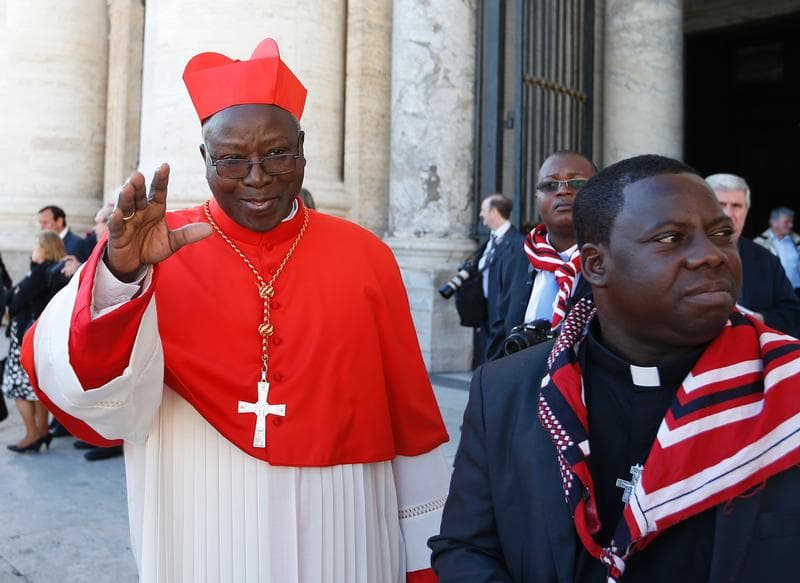ROME – Cardinal Philippe Ouédraogo, who is now recovered after contracting the coronavirus, has issued a statement insisting that the pandemic is not a punishment from God, and appealing for debt forgiveness to help cushion Africa from the economic devastation of the pandemic.
In his May 31 statement, Ouédraogo asked bilateral and multilateral aid agencies to “take a closer look” at Africa, which he said lacks sufficient resources and safety kits to fight the COVID-19 pandemic.
“Undoubtedly, initiatives have already been taken in the management of the impact of the pandemic, but we would like to go further to plead for the massive cancellation of debts of African countries, to enable them to revive their economies,” he said.
He also asked that “substantial aid” also be given to African nations to assure food security and to assist in the development of quality healthcare systems and the promotion of small and medium enterprises, with the aim of easing rising unemployment rates.
Archbishop of Ouagadougou, Burkina Faso and president of the Symposium of Episcopal Conferences of Africa and Madagascar (SECAM), Ouédraogo, 75, was tested for the coronavirus March 28 after experiencing severe symptoms and got the positive result two days later. A spokesman from SECAM told Crux that Ouédraogo is currently “quite well and has been working,” but they could not confirm whether he has completely recovered from the virus.
In his statement, Ouédraogo also issued an appeal for multinational companies and business owners who import raw materials from African nations to “make significant contributions to the host countries to enable them provide basic social services,” such as hospitals, schools, and affordable housing.
In the “race against the clock” to develop a vaccine for COVID-19, Ouédraogo asked that businesses and the pharmaceutical companies not “exploit the situation to make profit, but join in the efforts to provide care for vulnerable people.”
He urged the African Union to consider creating a solidarity fund aimed at improving the general health of the population, and asked African leaders “to ensure that the limited available resources be used to assist those who really need help, especially, the poorest of the poor and do not end in the pockets of the politically connected people through corrupt practices.”
Pope Francis has issued several appeals for debt relief for impoverished countries during the coronavirus, as have his top aides.
RELATED: Vatican vows to help poor and jobless, insisting, ‘That’s not socialism’
Ouédraogo in his statement prayed for all those sick with COVID-19 and those who have died from the disease, pointing to the “unprecedented” fact that the disease affects people of all countries and social classes. However, he noted that those who will suffer most in the fallout are the poor.
“It can be said without doubt that the consequences of the pandemic are tragic,” in terms of both the economy and the social sector, which in Africa “is already burdened with debt and where unemployment continues to worsen, which further increases even more the phenomenon of impoverishment of the populations,” the cardinal said.
Many people have questioned whether the pandemic is God’s punishment for humanity’s sins, while others ask whether the pandemic is perhaps an “omen” signaling that the end is near, Ouédraogo said, arguing that on the contrary, scripture proves that God is not only unable to turn against the world he created, but since humanity is made in his image and likeness, “If we experience pain or if we suffer, he participates in it in order to overcome it.”
He noted Jesus himself, though innocent, experienced pain and suffering, asking God on the cross why he had abandoned him, “but there was no immediate response from the Father until the moment of the resurrection.
“This urges us to always wait for God’s time,” the cardinal said.
“If Jesus suffered innocently, suffering should no longer be looked upon as punishment for sins committed or a curse,” he said, pointing to the crucifixion.
Ouédraogo said the pandemic must also be a time of solidarity, and “has revealed the limits of a globalization that has solely focused on the economy and advocating consumerism as well as individualism at the expense of ethical and spiritual values.”
He pointed to the example of healthcare professionals, “who do not make headlines,” as an example of selflessness and dedication, saying their work has led to an awareness in both developed and developing countries “that the world after COVID-19 will no longer be as before.”
“It is a new world in the making, one where equity will be more important than the frantic contest for success and profit,” he said.
He urged ecclesial institutions to get “directly involved” in the fight against the coronavirus, working also with non-Catholic entities to promote good health throughout Africa.
Praising the efforts being made by governments to contain the “brutal spread” of the coronavirus, Ouédraogo also voiced special thanks to the healthcare professionals and religious sisters, “who have shown extraordinary dedication to alleviating the suffering of the sick.”
The pandemic, he said, is a time “to reactivate the value of solidarity that has shaped our societies to better face the impact of the pandemic and to be able to turn our economies around.”
“In this time when many are in dire need, let us help them to experience the love of God. In the same vein, let us not stigmatize those who have recovered from COVID-19 disease but accept them warmly and make them feel happy to be back to their families or communities,” the cardinal said, urging all members of society to “join forces to achieve a harmonious development, concerned to preserve human dignity and sustainability of future generations.”
Follow Elise Ann Allen on Twitter: @eliseannallen













